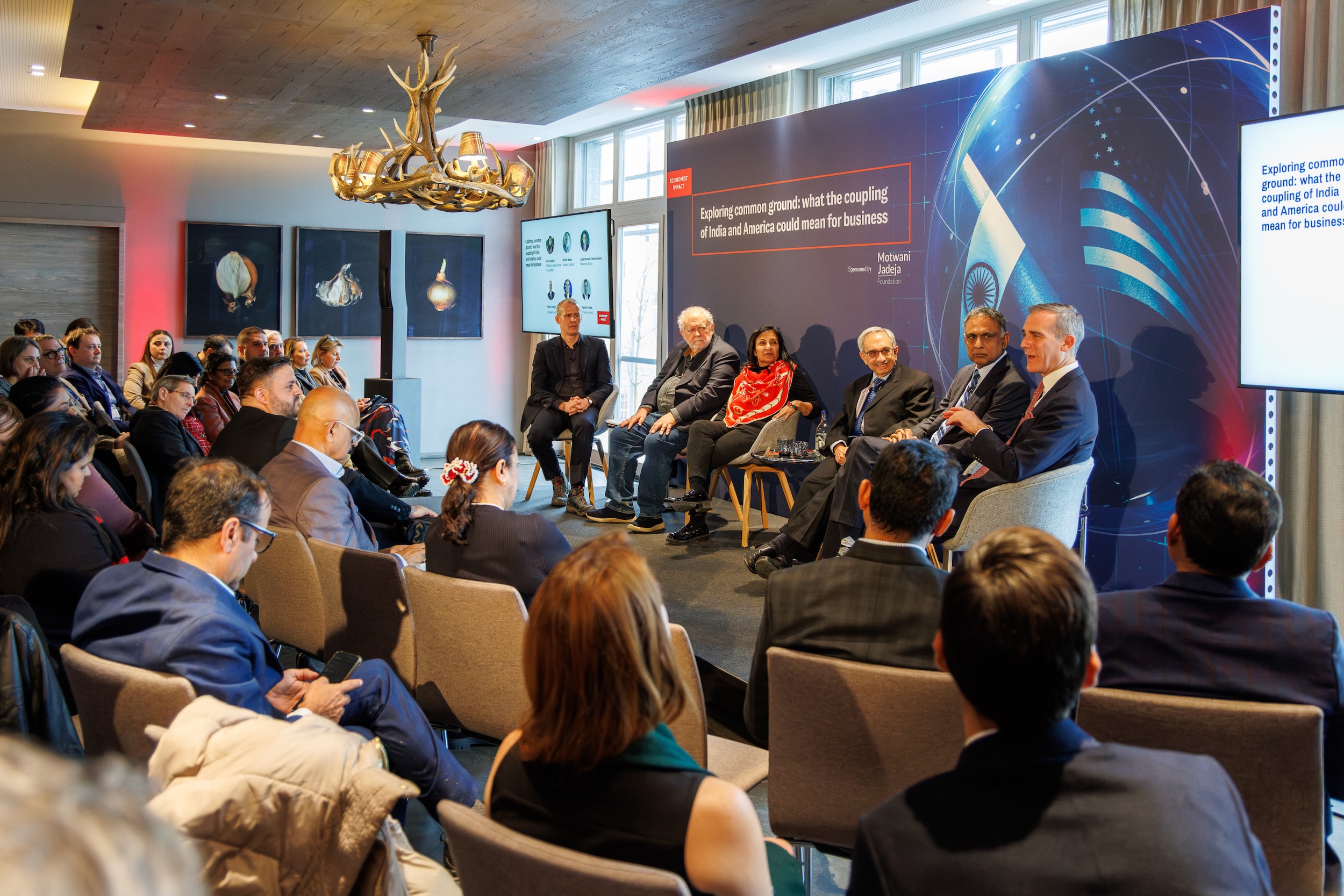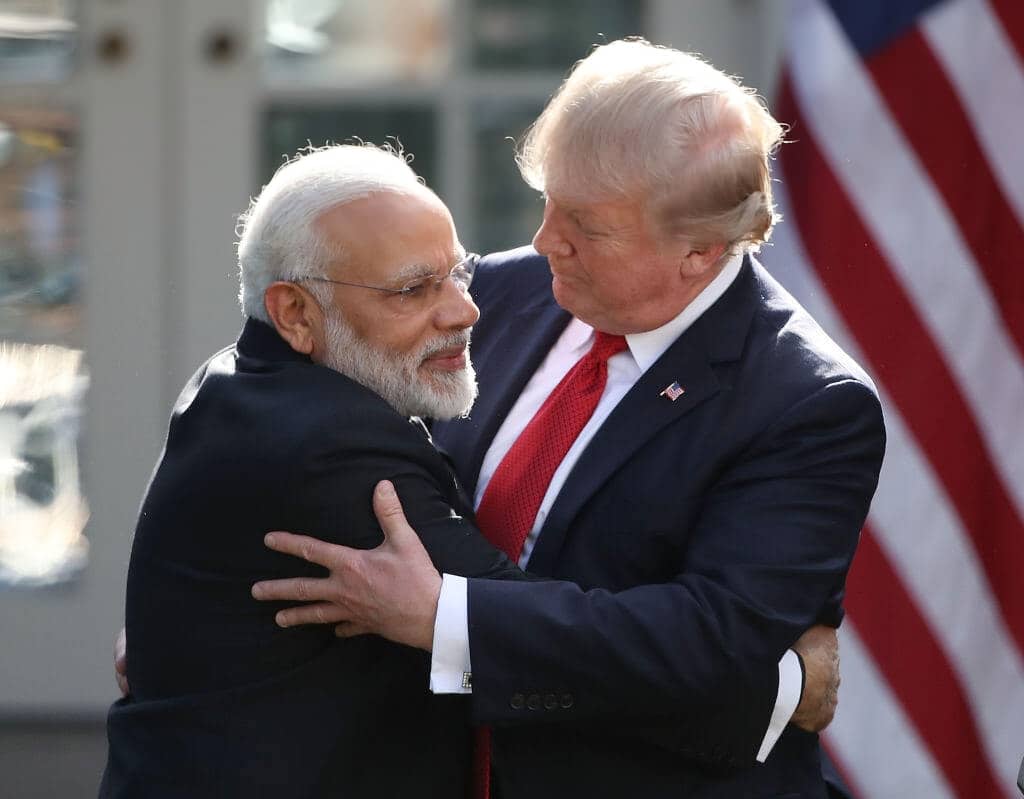Davos 2025: MJF supports key discussions on US-India relations
On January 23, 2025, a high-level panel discussion, titled “Exploring common ground: what the coupling of India and America means for business” on the evolving relationship between the United States and India was held at the Ameron Hotel in Davos, on the sidelines of the World Economic Forum (WEF) 2025. Organized by The Economist Impact and supported by the Motwani Jadeja Foundation (MJF), the event focused on the increasing economic and strategic partnership between the two countries, with an emphasis on technology, defense, and trade.
The panel included:
- Asha Jadeja, Founder of the Motwani Jadeja Global Foundation
- Eric Garcetti, Former United States Ambassador to India
- Lakshmanan Chidambaram, President of Tech Mahindra and Head of Americas at Mahindra Group
- Nadir Godrej, Chairman and Managing Director of Godrej Industries
- Walter Mead, Distinguished Fellow in Strategy and Statesmanship at the Hudson Institute
Patrick Foulis, Foreign Editor at The Economist, moderated the session.
A Partnership of Shared Values
The session opened with a reflection on the US-India partnership’s growth. Eric Garcetti, former US ambassador to India, spoke about the strategic importance of the relationship, emphasizing shared values such as democracy, freedom of speech, and economic opportunity. He highlighted the partnership’s resilience across different administrations, noting its expanding scope, especially in defense and security collaboration. However, Garcetti acknowledged that trade imbalances, particularly in agriculture and tariffs, remain a challenge, with the US calling for greater reciprocity.
Technology and Innovation: A New Frontier for Collaboration
Lakshmanan Chidambaram discussed the growing significance of technology in US-India relations. As the US and India remain global leaders in technology, Chidambaram emphasized how India’s rising tech capabilities could help address trade imbalances, particularly by boosting India’s role in software development and IT services. He acknowledged that the rise of automation and AI, while posing challenges to traditional IT service models, would ultimately create higher-skilled job opportunities.
A Poetic Vision on Infrastructure
Nadir Godrej contributed an unexpected yet powerful moment when he recited a poem about the importance of infrastructure for India’s economic future. He stressed that robust infrastructure is essential not only for economic growth but also to foster greater US-India business collaboration. His poem highlighted the need for a business-friendly environment that supports foreign investment and deepens economic ties between both nations.
Geopolitics and the China Factor
The discussion moved to geopolitics, particularly with regard to China’s role in global dynamics. Walter Mead and Eric Garcetti addressed the growing influence of China, recognizing that both the US and India are committed to countering China’s ambitions in the Indo-Pacific. While some experts feared the possible impact of a change in US leadership, the panelists agreed that the underlying US-India alliance would remain strong, driven by mutual goals of security and regional stability.
Addressing Environmental and Sustainability Challenges
A critical part of the conversation also focused on India’s environmental challenges, particularly air pollution. Garcetti highlighted US-India collaboration in tackling these issues through renewable energy projects, such as solar power initiatives. While progress has been made, the panel emphasized that more needs to be done, urging collective action from governments, businesses, and citizens to drive sustainable practices.
Asha Jadeja’s Vision for the Future of US-India Collaboration
Asha Jadeja, reflecting on the significance of the event, highlighted how the global conversation on US-India relations has shifted. With a focus on defense, security, and economic collaboration, she noted the unprecedented opportunities arising as US businesses move out of China. The expanding partnership in areas like semiconductor manufacturing, ports, and software infrastructure is poised for explosive growth. She emphasized the opportunities in AI collaboration between Silicon Valley and Bangalore, underscoring how this could catalyze new innovations for both countries. Jadeja encouraged continued dialogue and engagement, sharing that the discussions held at Davos would drive US-India business collaboration for years to come.
A Resilient Partnership for Global Leadership
The event wrapped up with a strong message of resilience. Despite differences in foreign policy priorities and domestic challenges, the US-India partnership continues to evolve and thrive. Shared values, such as democracy and free-market capitalism, alongside the drive to address common global challenges, ensure the ongoing success of this vital collaboration.
As both countries move forward, their alliance will play a critical role in shaping the future of the global economy, particularly in sectors like technology, defense, and sustainability. For businesses and governments, the message was clear: the time to invest in the US-India partnership is now.



